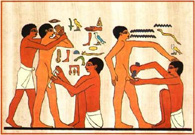No evidence circumcision reduces HIV risk in gay men |
|
|
Ever since studies showed that male circumcision halved the risk of female-to-male HIV infection, many have wondered what impact circumcision has on men who sex between men. Although scientists have reported that circumcision has been shown to reduce heterosexual men's risk of getting HIV from sexual intercourse with women, a new study now says there is not enough evidence to say circumcision protects men from getting HIV during sex with other men.  One of the oldest and most common surgical procedures in the world, male circumcision is the surgical removal of some or all of the foreskin (or prepuce) that covers the head (glans) of the un-erect penis. Compared with the dry external skin surface, the inner mucosa of the foreskin has less keratinisation (deposition of fibrous protein), a higher density of target cells for HIV infection (Langerhans cells), and is more susceptible to HIV infection than other penile tissue in laboratory studies. The foreskin may also have greater susceptibility to traumatic epithelial disruptions (tears) during intercourse, providing a portal of entry for pathogens, including HIV. In addition, the microenvironment in the preputial sac between the unretracted foreskin and the glans penis may be conducive to viral survival. Finally, the higher rates of sexually transmitted genital ulcerative disease, such as syphilis, observed in uncircumcised men may also increase susceptibility to HIV infection. Source: Centers for Disease Control and Prevention
Circumcised gay men were 14 percent less likely to be infected with the human immunodeficiency virus, or HIV, than those who were uncircumcised, but the finding was not statistically significant, the researchers said. "Over all, we're not finding a protective effect associated with circumcision for gay and bisexual men," said behavioural scientist Gregorio A. Millett. The study is published in the October 8 issue of the Journal of the American Medical Association (JAMA). Millett and his colleagues reviewed 15 studies which involved 53,567 (52 percent of whom were circumcised) gay and bisexual men in the United States, Britain, Canada, Australia, India, Taiwan, Peru and the Netherlands. Report info "Circumcision Status and Risk of HIV and Sexually Transmitted Infections Among Men Who Have Sex With Men: A Meta-analysis" Gregorio A. Millett; Stephen A. Flores; Gary Marks; J. Bailey Reed; Jeffrey H. Herbst JAMA. 2008;300(14):1674-1684. Vol. 300 No. 14, October 8, 2008 Click here for Abstract. |
Sign In

讀者回應
We forget one important thing: people who demand circumcision are actually demanding THE RIGHT TO MUTILATE OTHERS, not themselves. Shouldn't that make us tread a little more cautiously? Shouldn't the person who is actually going to be mutilated and affected have some say in this matter?
What if medical research showed that having four fingers instead of five reduced the incidence of some kind of disease? Or that our ears attracted too many bad bacteria? Would we rush just as eagerly to get our children's fingers and ears chopped off ? Or would we think that perhaps those decisions were best left to the person who would actually be affected?
Why do some parents rush so desperately to get their child mutilated, as if it is some kind of contest that they simply must win? What is the problem in allowing the child to take his own decision regarding circumcision when he is old enough? Some cultures indeed have adult circumcision, as a rite of passage into manhood.
Why not allow the child to find out what it feels like to have a foreskin? Aren't parents being selfish in forever depriving the child of an opportunity to see and feel the foreskin that was actually very much a part of his body before they got it hacked off without consulting him? How will the child know the difference if he never had a foreskin for comparison?
I saw a video on YouTube, of a baby being circumcised. The baby appeared traumatised and in terrible agony as the doctor took his own sweet time stretching and loosening the foreskin, cutting through with a pair of scissors and then cutting all around to remove the foreskin.
Aren't there less painful ways of doing it? Perhaps with local anaesthesia? Or is that dangerous?
There are indeed some physical conditions in which it is a good thing to get circumcised. One is "phimosis", where the foreskin is so tight and narrow at the tip that it is very hard to push it back, and therefore the person simply cannot have sex without extreme discomfort. Circumcision in this case will certainly improve the person's sex life, while not having it done could lead to adverse effects. This again will become apparent when the child gets older, and not so much as a baby.
Perhaps we need to stop and wonder if nature had a good reason for providing the foreskin. And also, perhaps we should give the affected person the opportunity to take his own decision when he is old enough.
Bryan of Ealing (UK)
and pls don't use poppers,
don't do bareback
Please login to post a comment